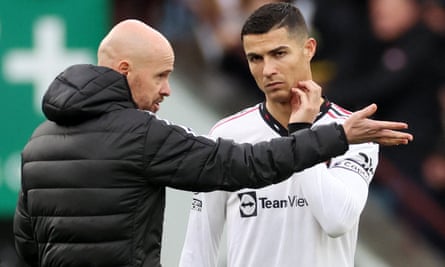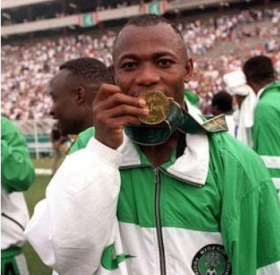Ronaldo wanted to be centre-stage but now has to head for the exit door | Manchester United
The saddest aspect of Cristiano Ronaldo’s interview with Piers Morgan was that so much of it was so accurate. He correctly identified that Manchester United has not evolved much since he left, that the club has been undermined by terrible decision-making. When historians of the future come to write of United’s post-Ferguson struggles, the transcript will provide a very useful precis. But in his diagnosis there is a blind spot: the worst decision United have made since 2013 was to re-sign him.
This, perhaps, is the tragedy of the great sportsman. Ronaldo may be a preening narcissist, and ego of such overwhelming gravity that he inevitably dominates any club for whom he plays, but he has also been one of the greatest footballers of all time and is all the more remarkable for having made himself so. The comparison with Lionel Messi is hackneyed but irresistible. Messi has often seemed almost diffident, as though a great talent acts through him and he a semi‑willing conduit. Ronaldo has, with tremendous single‑mindedness and strength of will, worked and worked to transform his ability into something extraordinary.
His dedication to self‑improvement made him great, but it is that same self‑absorption that makes him at times such a difficult teammate, that same self-belief that perhaps prevents him realising the extent to which his powers have waned.
And that, of course, is why he has been so outraged by what seem to him inexplicable snubs such as being left on the bench against Tottenham. It’s not that his form has dwindled. It couldn’t possibly be that it is best for the team if he is a substitute. It could only be that Erik ten Hag disrespects him. But alongside that bristling self-assertion, underlying it, perhaps even provoking it, there is something else: insecurity. In Josh Robinson and Jonathan Clegg’s book Messi vs Ronaldo, there is a fascinating detail about Ronaldo, at the height of his Real Madrid fame, meeting a physio who had worked with him when he was in his teens at Sporting and handing him a printout of all his awards, as though he felt a need to justify himself and what he had done with his talent. In that, perhaps, there is still a glimpse of the weedy kid from a difficult background in Madeira, an outsider who was mocked for his provincial accent when he arrived in Lisbon. There is a vulnerability to his genius.
In practical terms, it makes little difference what has created this ego. Even in his first spell at United when he won three league titles and a Champions League, his reluctance to fulfil his defensive responsibilities meant that, in European games, he would be deployed at centre‑forward with Wayne Rooney moved to the left because he could be trusted to track his full-back.

Ronaldo was a brilliantly skilful player, but his desperation to be centre-stage created issues. He scored the equaliser when United beat Chelsea in the Champions League final in Moscow with the sort of header that would become a trademark but then, having missed a penalty in the shootout, he stood crying by himself on the halfway line as his teammates celebrated Edwin van der Sar’s decisive save from Nicolas Anelka in front of the United fans.In that, perhaps, there was an echo of George Best, who was so disappointed by his ownperformance when United beat Benfica to win the European Cup in 1968 that he left the celebrations and got properly drunk for the first time. And, as with Best, United need to break their obsession with a brilliant number seven who is no longer what he was.
Ronaldo’s demons are different, but he was never a team man. That has always been the doubt, particularly as pressing became increasingly important. He won four Champions Leagues with Real Madrid and had a happy knack of scoring not just lots of goals but also decisive goals. But there was a reason Madrid were prepared to let him go. And so began a pattern that has defined his last five seasons. In three seasons at Juventus, Ronaldo scored 81 league goals, but the team got worse, and never scored as many in a single season as they had the year before he arrived.
At United it was similar. There were those who celebrated the 18 league goals he scored last season as a remarkable effort in a failing team, the only bulwark between United and humiliation, but the fact is rather that he was the antidote to a problem he caused. In 2020-21, without Ronaldo, United had a clearly defined if basic system, sitting deep and attacking at pace on the break and finished second, scoring 73 goals and totalling 74 points; the following season, with Ronaldo, that fluency was lost and they finished sixth, scoring 57 goals and totalling 58 points.
Ten Hag is a hard-pressing coach. His appointment meant that either he was going to undermined by Ronaldo or he was going to get rid of him, and it ended up being the latter. Ten Hag has been steely enough to do things his way, to cut through the celebrity fug that always surrounds Ronaldo. And, frankly, with his repeated strops, Ronaldo has made his task easier. There are very few among regular match-goers who still think he should be in the side. This season, United have averaged 1.0 points per game in league matches he has started; 2.2 without him.
Ronaldo’s return was an extremely costly error, undermining not one but two coaches and apparently diminishing the confidence of a number of young players. In his solipsism, though, that seems not to concern him: there is Ronaldo and his quest for records and goals, and there is everybody else. Fans should remember how Ronaldo was the first time round, should celebrate what he was, but his return has been a failure. Chasing past glories, yielding to the siren call of nostalgia, is rarely a successful way to run a football club. United have accepted Ronaldo is done; it may be that he soon has to accept that too.





